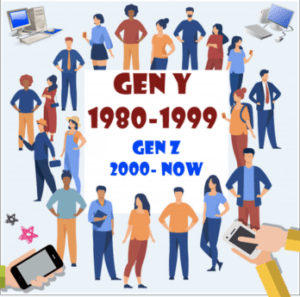Gen Z continues to remain a mystery for many organisations. It has always been challenging to understand the members of this cohort as their needs and requirements can be quite ambiguous.
A recent study conducted by RPG Group, in collaboration with Yuvaa Insights Studio, has unveiled intriguing insights into Gen Z. Spanning across 13 Indian cities, the study was commissioned with the primary goal of understanding the true essence of happiness for this generation and how corporates can transform their approach to provide efficient working environments.
The study delves into the complexities of Gen Z, offering valuable information for organisations seeking to connect with and engage this unique generation.
It is important to note that the Indian Gen Zers are distinct from their global counterparts. What is even more important is that even within India, there exist distinct variations among them.
The workplace expectations of Gen Zers align closely with their societal expectations. They view work as not just a form of worship but as a liberating and essential means to fulfill their purpose. They seek a purpose-driven work environment that allows them to contribute meaningfully and make a positive impact while pursuing their career goals.
Those residing in the metros often find themselves alienated from the existing culture and society due to the fast-paced and modernistic nature of city life. They yearn to experience a sense of belonging and tend to gravitate towards community living, but unfortunately, lack the means to bring this desire to fruition.
On the other hand, individuals from non-metro areas are deeply rooted in community living, fostering a sense of privacy, belonging and cultural openness. However, this strong sense of community can make it challenging for them to fully embrace their individuality due to societal and cultural constraints. They feel a strong urge to break away from societal ties to gain more autonomy and find a balance between their individualistic aspirations and the collective culture they are part of.
The study suggests that the urbanised section of Gen Z appears to be a confused and conflicted group. First, they lack role models at home, in society, and even in the media. This absence of influential figures during their formative years has led them to seek out online communities that offer instant gratification and an abundance of choices. However, this digital environment lacks real guidance and direction for them.
The urbanised Gen Zers are always in a difficult position trying to negotiate on their identity on a daily basis. The problem is that the Gen Zers find the existing societal values to be orthodox and on the other hand, their ideas and beliefs are not accepted by society.
For Gen Zers, work is not solely about money. Rather, it represents financial independence coupled with a purpose-driven community eager to create a positive impact on the world.
The abundance of choices and the lack of proper guidance have led Gen Z to experience decision paralysis. Factors such as sheltered parenting, digital communication shortcuts, limited resources and support, have all contributed to this phenomenon.
This is why, Gen Zers find it challenging to engage in difficult conversations and often avoid confrontation at an individual level.
What Gen Z needs
The study suggests that organisations that hire Gen Zers will have to provide instant feedback, validation, inspiration and a clear path with support in order to keep them happy and motivated.
This young lot aspires to create a world characterised by equity and peace. They are dedicated to championing the causes they deeply believe in. They advocate a broad spectrum of issues — including diversity, equity and inclusion, promoting good mental health and ensuring access to mental health resources, respecting individual boundaries, embracing sustainability and environmentalism, promoting non-violence, advocating for sex positivity, supporting gender fluidity, fighting for LGBTQ+ rights — challenging the patriarchy and gender norms and creating space for the voices of the underprivileged and oppressed to be heard and amplified.

Gen Zers yearn for acceptance from society in the truest and most authentic form, and they consider complete authenticity to be a non-negotiable aspect of their identity. They value being able to express themselves genuinely, without fear of judgment or discrimination, and they seek an inclusive society that respects and embraces their individuality.
What sets them apart from every previous generation in India is their genuine appetite for risk-taking. Gen Zers display a unique combination of ambition and audacity, which drives them to pursue their aspirations fearlessly.
They are constantly searching for career paths that intersect their passion and offer ample opportunities, considering this a critical aspect of their self-discovery journey.
The workplace expectations of Gen Zers align closely with their societal expectations. They view work as not just a form of worship but as a liberating and essential means to fulfill their purpose. They seek a purpose-driven work environment that allows them to contribute meaningfully and make a positive impact while pursuing their career goals.
For them, work is not solely about money. Rather, it represents financial independence coupled with a purpose-driven community eager to create a positive impact on the world.
They aspire to work for a company that fosters their personal growth and enables them to explore their true potential. They yearn for employers who encourage and nurture their creativity, not constraining it. Feeling a sense of belonging in the workplace is vital to them as it ignites their creative inspiration and allows their innovative ideas to flow freely.
They want to be heard and valued. Even the freshers wish for their inputs to be sought, so that they experience a sense of belongingness and feel appreciated.
It is a good bonding and healthy relationship with seniors and juniors that they seek, along with appreciation, rewards and bonuses.
They have the confidence to stand up against unfair practices and uphold their value system. They do not want to waste their time chasing a goal that is not theirs.
At work, Gen Zers from the metros tend to be more dissatisfied and have higher expectations, which can be attributed to their increased awareness and exposure to diverse cultures. In contrast, Gen Zers from non-metro areas rank all parameters higher, indicating that their benchmark and awareness levels are comparatively lower. They seem content with companies that offer limited efforts to meet their expectations.
For Gen Zers, certain workplace essentials are non-negotiable. Their list of priorities is topped by flexible work options, focus on mental health, personalised workspaces, relaxed dress code, and a personal connection with top management.
Moreover, they consider growth and opportunities, competitive salary and incentives, work-life balance, continuous learning and development opportunities, as well as regular appreciation and recognition to be fundamental aspects of their work experience. These essentials are vital to their job satisfaction and overall well-being in the workplace.
What should employers do to draw and retain Gen Zers?
Gen Z will dominate the future workplace. Therefore, employers should ensure they are presented with the relevant avenues to explore and attain their full potential. Their work boundaries should be clarified to them, so that their ‘me’ time is not encroached upon. Remember, they need job security, mental health as well as happiness. Steps need to be taken to ensure a positive and efficient working environment for them.
This cohort prefers to be seen as they truly are. They do not believe in hiding their emotions or their identity. Therefore, they will require a caring work culture that respects them, treats them as humans and upholds equality. They are drawn towards a robust value system that is concerned about human beings, animals, the world and planet Earth. They sure do mean business when they say that business is all about making profits, but “not at the cost of the people and the planet”.


